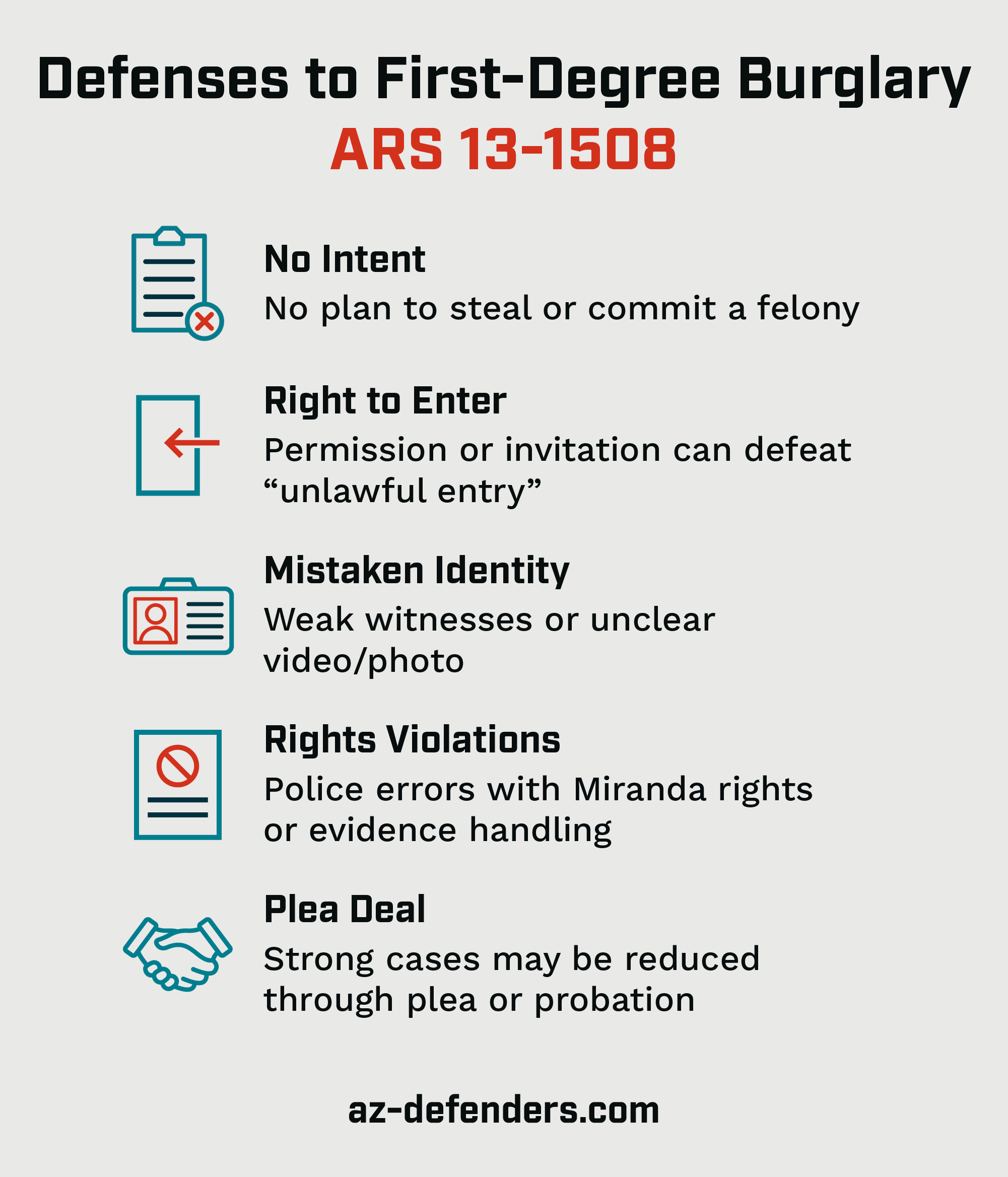
Posted on October 31, 2025 in Theft & Shoplifting
In Arizona, first-degree burglary is a more serious variation of second- or third-degree burglary. The legal definition of first-degree burglary is that a person or an accomplice commits a second-degree or third-degree burglary offense while knowingly in possession of explosives, a deadly weapon, or a dangerous instrument during the commission of the offense.
Under Arizona law, a first-degree burglary conviction is a Class 2 felony or Class 3 felony, depending on the nature of the property that was burglarized, which may result in up to 21 years in prison for a first time offender.
AZ Defenders represents people charged with burglary crimes, including first-degree burglary. Call our law firm at (480) 456-6400 for premium legal defense.
In this post, we discuss:
Arizona Revised Statutes (ARS) Section 13-1508 is the statute that defines first-degree burglary. The statute is short; we present it in its entirety here:
Burglary in the first degree; classification
A. A person commits burglary in the first degree if such person or an accomplice violates the provisions of either section 13-1506 or 13-1507 and knowingly possesses explosives, a deadly weapon or a dangerous instrument in the course of committing any theft or any felony.
B. Burglary in the first degree of a nonresidential structure or a fenced commercial or residential yard is a class 3 felony. It is a class 2 felony if committed in a residential structure.
ARS 13-105 is the definition statute for Arizona’s criminal code. Subsection 15 defines a deadly weapon as “anything designed for lethal use, including a firearm.” A gun or a knife (including even a folding pocketknife) is an example of a deadly weapon.
Under ARS 13-105(12), a dangerous instrument is “anything that under the circumstances in which it is used, attempted to be used or threatened to be used is readily capable of causing death or serious physical injury.”
In the context of a first-degree burglary, examples of dangerous instruments include a baseball bat, a hammer, a brick, a box cutter, screwdriver, etc. Even a car can be a dangerous instrument if it is used to drive through a store window in the commission of a third-degree burglary.
Dangerous offenses are those that involve using, discharging, or exhibiting a deadly weapon or a dangerous instrument, or knowingly or intentionally causing or inflicting a severe bodily injury on another person during the commission of a crime.
Whether first-degree burglary charges are Class 2 or Class 3 felonies depends on the underlying nature of the burglary. The table below outlines the legal penalties for each of these felony types.
| Dangerous Offense Classification | Class 2 Felony | Class 3 Felony |
| No historical felony convictions | Prison sentence of 7 to 21 years | Prison sentence of 5 to 15 years |
| One historical dangerous felony conviction | Prison sentence of 14 to 28 years | Prison sentence of 10 to 20 years |
| Two or more historical dangerous felony convictions | Prison sentence of 21 to 35 years | Prison sentence of 15 to 25 years |
Other penalties aside from prison time can include:
Aggravating factors are those that may increase your sentence. Examples of aggravating factors that could increase the sentence for a second-degree burglary conviction include but are not limited to:
Mitigating factors are those that a court can consider that might reduce the duration of a prison sentence. Examples of mitigating factors include, but are not limited to:
The full list of aggravating and mitigating circumstances can be found in ARS 13-701(D) & (E).
Because first-degree burglary is a variation of a second- or third-degree burglary, the defenses are effectively the same as for other Arizona burglary cases.
Here are some common defenses to first-degree burglary charges in Arizona.
Burglary involves three acts: 1.) possession of explosives, deadly weapon, or dangerous instrument; 2.) unlawful entry or remaining on the property; and 3.) with the intent to commit theft or any felony.
If you can cast reasonable doubt on the prosecution’s case that you intended to steal something or commit a felony-level offense therein, you may be able to reduce a burglary charge to a lesser charge.
For example, if you enter residential property and only intended to commit or actually did commit a misdemeanor-level offense that does not involve theft, such does not meet the definition of felony burglary.
You should note that it is probably not a defense to argue that you did not intend to commit a felony-level act of theft, but a misdemeanor-level theft instead. The language of ARS 13-1507 refers to “any” theft crime; it does not require the theft to be a felony act.
If your presence on the property was arguably as an invitee or licensee, you can challenge the unlawful entry element of the prosecution’s case.
Or if you remain on the property after the owner, controller, or manager of the property makes a reasonable request for you to leave, you would want to address the reasonableness of the request as such may provide you with a defense to a burglary charge.
Sometimes, the only evidence linking you to a burglary may be photo or video evidence or witness testimony from someone who may not have seen the burglar adequately enough to make a positive identification.
Such evidence could lead you to be charged as the culprit, especially if the person who committed the burglary was wearing a mask that makes positive identification difficult or impossible.
If you can establish an alibi for where you were when the alleged second-degree burglary was being committed, this can often cast enough reasonable doubt on the prosecution’s case against you.
If the police and the prosecutor’s office do not carefully follow procedures in arresting you or gathering and handling of the evidence against you for a first-degree burglary charge, you may be able to challenge the admissibility of that evidence and/or the strength of that evidence.
For example, if the police violate your constitutional rights while you are in custody for a first-degree burglary charge, this can lead to evidence not being allowed to be presented at trial, which can seriously disrupt the prosecution’s case against you.
Or, if law enforcement failed to properly maintain the chain of custody of evidence in its possession that it intends to present, this failure can also lead to the evidence being deemed inadmissible in court.
If the evidence against you is too strong, your attorney may switch to a strategy of mitigating your Arizona first-degree burglary charges. This may mean negotiating a plea deal in which you admit guilt in exchange for reduced charges and/or punishment.
Alternative sentencing is another possibility. For example, your burglary defense attorney may negotiate with the prosecution for probation as an alternative to incarceration, with conditions like community service, drug testing, and/or counseling.

A first-degree burglary conviction carries severe penalties, such as state prison time, massive fines, and a felony conviction on your record. With so much on the line, if you are facing charges for first-degree burglary, you should seek out the best possible legal defense immediately.
At AZ Defenders, our experienced criminal defense attorneys provide legal help to Arizona residents against property crime charges, including all forms of burglary. Our Phoenix burglary lawyers are known as some of the most aggressive criminal attorneys in the state.
Give us a call at (480) 456-6400 or contact us online to schedule a free case evaluation with one of our highly experienced Arizona criminal defense attorneys.